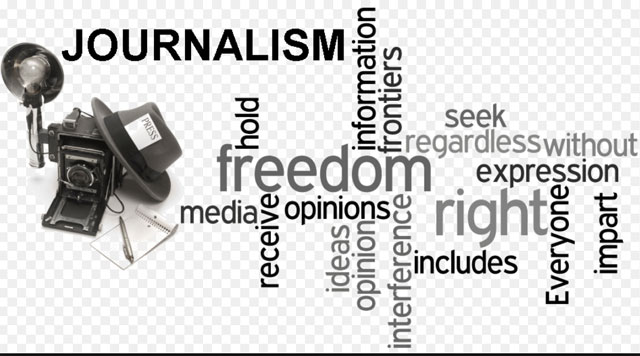
It’s failed to produce an internationally coordinated and funded strategy to support public-interest media
COMMENT | JAMES DEANE | In July 2019, the United Kingdom’s foreign secretary, Jeremy Hunt, launched a global campaign for media freedom at a London conference co-organised by the Canadian government. “Today, we are joined by delegations from over 100 countries … never before have so many countries come together in this cause,” he proudly announced. The event established the Media Freedom Coalition, and more than 50 countries have since joined.
The impetus behind the media-freedom initiative was the October 2018 assassination of Saudi journalist Jamal Khashoggi in the Saudi consulate in Istanbul. Khashoggi’s gruesome murder was a state-sanctioned killing orchestrated by individuals at the highest echelons of the Saudi regime. In the wake of his death, media freedom quickly rose to the top of the UK government’s foreign-policy agenda.
The media-freedom campaign represented a rare lull in the tense geopolitical climate that followed the 2016 Brexit referendum and the election of U.S. President Donald Trump. It also offered a unique opportunity for the UK to provide genuine leadership on an issue that the international community had largely overlooked.
The July 2019 conference managed to attract significant (albeit not spectacular) government participation and received support from civil-society groups worldwide. Prominent global figures joined the initiative, including human-rights lawyer Amal Clooney, who was appointed the UK’s Special Envoy on Media Freedom. On a smaller scale, during my time at BBC Media Action, I organised a gathering of leading international media-support organisations in London. The aim was to assist in the organisation of the conference, a process that initially required addressing concerns that the effort was merely a post-Brexit public-relations exercise. Numerous other individuals and organisations dedicated their time, as well as their personal and professional reputations, to ensure that the conference and ensuing campaign would deliver tangible results.
But the British government’s recent decision to invite Saudi Crown Prince Mohammed bin Salman (widely known as MBS), whom U.S. intelligence agencies have identified as having sanctioned the Khashoggi assassination, calls into question its commitment to media freedom.
To be fair, in seeking to reestablish economic and political ties with Saudi Arabia, British Prime Minister Rishi Sunak follows in the footsteps of French President Emmanuel Macron, U.S. President Joe Biden, and other leaders, all of whom have faced accusations of hypocrisy from human-rights organisations. Given the UK’s current economic weakness, Sunak may have found it harder to buck the trend.
But, hypocrisy aside, MBS’s upcoming visit to London shatters any illusion that the UK can provide the moral leadership required to defend democracy, media freedom, or the rules-based international order. Worse, it devalues the efforts of those who supported its initiatives.
Admittedly, the media-freedom campaign and follow-up conferences have had little impact. While they have motivated like-minded governments and stakeholders to reaffirm their commitment to the cause, they have been far less effective at curbing attacks on journalists or addressing the political and financial challenges facing independent news organisations around the world.
The UK’s own credibility has also taken a hit. In September 2020, Clooney resigned from her role as media-freedom envoy over the government’s Internal Market Bill, which aimed to regulate post-Brexit domestic trade and as the government itself acknowledged violated international law.
The government’s campaign has failed to achieve the goal of producing an internationally coordinated and properly funded strategy to support public-interest media. Remarkably, the resources provided by the UK government to international media support have actually decreased in recent years, despite its pledges to increase funding. Similarly, the financial-aid budgets of other prominent coalition members, such as Canada and the Netherlands, have remained largely unchanged.
Vibrant, independent news media remain the best defense against autocracy. But as news organisations face an existential financial crisis, the prospect of a coordinated and well-funded global strategy to support journalism remains almost as distant as it was when the media-freedom initiative was launched more than four years ago.
As Hunt observed, the fact that Khashoggi was murdered inside a diplomatic mission represented a clear threat to the rules-based international order. Initially, Hunt’s media-freedom campaign appeared to be a serious response to this threat and a much-needed display of political leadership, and the Media Freedom Coalition, currently co-chaired by Estonia and the Netherlands, might still produce meaningful results. Several countries, such as France and the United States, have recently stepped up their support for independent media, partly through initiatives like the International Fund for Public Interest Media (which I co-founded).
But MBS’s upcoming UK visit suggests that the UK and other countries are wavering in their commitment to protecting media freedom. If the British government is serious about upholding democracy and protecting the rules-based international order, it should devote significant funds to support public-interest news organizations and live up to its promise to “stand with those who seek to report the truth and bring the facts to light.”
*****

James Deane, a former director of Policy and Research at BBC Media Action, is Co-Founder of the International Fund for Public Interest Media and an independent consultant.
Copyright: Project Syndicate, 2023.
 The Independent Uganda: You get the Truth we Pay the Price
The Independent Uganda: You get the Truth we Pay the Price



